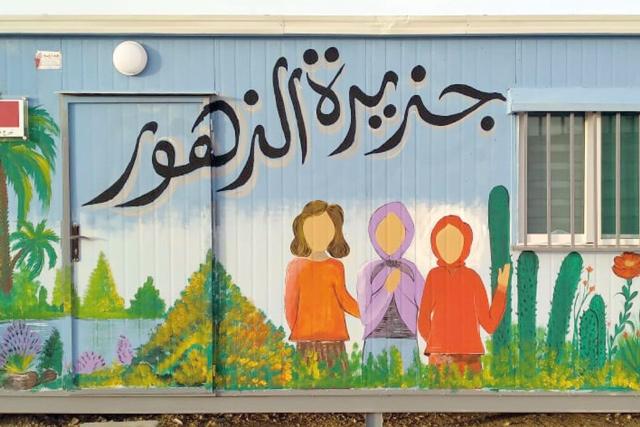- Local News
- Mon-2021-03-15 | 01:06 pm

Mercy Corps has established a new girls’ caravan in Azraq refugee camp, as part of its safe space expansion, aimed at opening up the lives of and taking action for adolescent girls.
Funded by the Ministry of Foreign Affairs of the Republic of China (Taiwan), the programme aims to build girls’ social assets and potential through setting up safe spaces where they could discuss and reflect on their needs and changes that take place during adolescence and identify multiple gaps and issues such as sexual and reproductive health (SRH) and puberty, Deputy Project Manager Hana Shalouf told The Jordan Times over the phone on Sunday.
Mercy Corps together with Wisdom and Information on Sexual Education by Girls (WISE Girls), which is a cohort of teen educators that design accurate, interactive, story-driven puberty education sessions, deliver puberty educational programmes to younger teen girls, helping them safely navigate menstruation and their changing bodies and lives in the refugee camp, according to Mercy Corps.
"As many persons view the talks that are related to puberty and menstrual education as awkward conversations, having peer educators offer a comfortable environment for adolescents, in addition to creating an opportunity for all of the young girls to freely engage with each other,” Shalouf noted.
The safe space in Azraq camp was established in January 2021, Shalouf said, adding that the caravan was completely designed and furnished by the girls, which helps in developing their leadership skills.
She pointed out that the safe space idea started first in the Zaatari camp back in 2018.
The caravan includes a private bathroom and a small kitchen to ensure physical safety and privacy.
"When girls have less of a voice in their lives, they are more at risk of early marriage and social isolation. The restrictions can take a toll on their mental health and wellbeing,” according to a Mercy Corps statement sent to The Jordan Times.
According to the United Nations High Commissioner for Refugees (UNHCR) latest data, approximately 9,479 Syrian girls aged 11 to 17 are growing up in the Zaatari camp and over 3,000 teenage girls live in Azraq camp.
"Here, [when I was young] I used to live freely. I used to go and play outside. It did not matter if I am playing with a boy or a girl. Now the rules over my life are set. I only study most of the time, and I can use the phone to listen to music sometimes. Harassment is everywhere, it is dangerous outside,” Hiba, a 17-year-old girl who lives in Azraq camp said in the statement.
In February and March 2020, Mercy Corps using a participatory research approach, conducted a qualitative study with adolescent girls in Village 5 in Azraq camp, which said that they had limited knowledge of menstruation and puberty, and their need for self-care.
Moving forward, the programme aims to invite a group of adolescent young girls, young women, and Mercy Corps’ Ishrak programme’s female volunteers to a workshop to design the new space and arrange priorities for current and new activities based on adolescent girls’ preferences and decisions.









